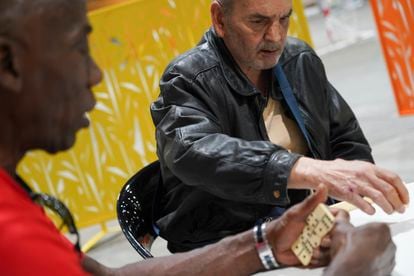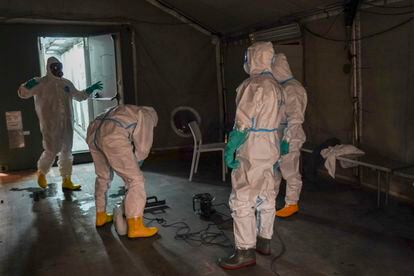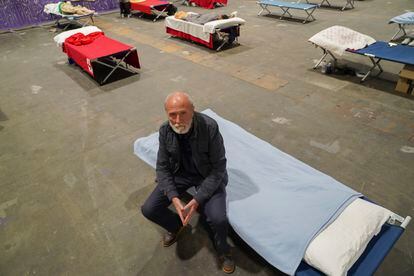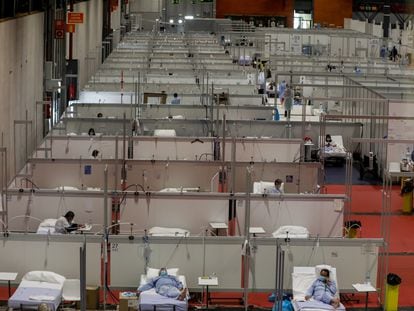Homeless face uncertainty under Spain’s deescalation: ‘The situation outside is awful’
As the coronavirus crisis eases, Madrid City Hall is planning on closing two emergency shelters, leaving many rough sleepers in an even more precarious situation
/cloudfront-eu-central-1.images.arcpublishing.com/prisa/EMKVYBWAZJGZVH63K35YH4ZAPM.JPG)

Jesús introduces himself by spreading his arms as if on a cross, before continuing with his game of dominoes. He does not bang the table with the pieces as is often the way. Rather he places his dominoes down quietly, as though troubled. Wearing a turquoise rosary around his neck, this 62-year-old once had a very different life. Between the ages of 23 and 40 he lived in New York. Now he spends his days shuffling around the emergency shelter for rough sleepers in Madrid’s Ifema conference center.
The man he is playing with is Heliodoro, 64, born on the Caribbean island of Curaçao. He listens indifferently to Jesús’s account of his life, as though he has heard it all before.
While in New York, Jesús worked in a hotel on Fifth Avenue, close to the Trump Tower and Central Park. When he left the United States, he also left two wives and three children behind. According to Jesús, one of his wives was a beauty queen in Ecuador. “I married for love and spent a month in Florida on my honeymoon,” he says. “Niagara Falls, California, Texas.” His voice is hoarse and laden with nostalgia as he recalls a time when money wasn’t a problem. ”I spent my money,” he says. “I was rich and now I’m lower class.” Right now, Jesús is sleeping on a bed that is lined up alongside 149 other beds in Pavilion 14 of Ifema’s emergency center. At the height of the coronavirus crisis, Ifema was also turned into Spain’s largest field hospital. With the outbreak slowing, the areas designated for coronavirus patients were officially closed last week, and the emergency shelter is expected to shut down at the end of May.

Since the shelter opened on March 20, it has attended to 240 people. Some have left voluntarily and others have been thrown out for aggressive behavior, according to the shelter’s coordinator Raúl Torres, who works for Grupo 5, the company hired by Madrid City Hall to run the operation. Of those using the premises, 60% are foreigners, including Latinos, North Africans and Eastern Europeans, and 40% Spanish. The average age is 45. As well as having their temperature taken every day, there are workshops and activities to fill the time – music sessions, access to gym facilities, movies, a library and storytelling.
There is also an area designated for prayer, so that the 25 Muslims here can properly observe the month of Ramadan, which will end this year on May 23. Beside it are plastic buckets with water for ablutions and tables and chairs to accommodate their different meal times as they abstain from eating and drinking during daylight hours.
“I love reading,” says Mohamed, who has a copy of Cosa Nostra by John Dickie in his hands. “I have been reading since the age of 10.” Originally from Morocco, Mohamed was one of the first to arrive at the shelter. He has breakfast at 5am, before the sun rises, and at midday he sleeps while members of the Emergency Military Unit (UME) disinfect the facilities. When they do this, everyone has to go out into the yard. There is a temporary feel to everything. No one knows how long they will be allowed to stay here.

“Uncertainty does not mean improvisation,” argues Darío Pérez, head of Madrid’s social emergency department Samur Social, who explains that there have only been nine positive diagnoses for Covid-19 in the entire public network managed by Samur Social, which has converted a hotel in the neighborhood of Las Tablas to treat those with symptoms.
Every day there is more talk about how to address the social and economic fallout of the coronavirus crisis. Madrid City Council knows that it is not going to be easy to close a temporary shelter like the one in Ifema. “This crisis cannot be compared to others,” says Pérez. The emergency contracts for the Ifema shelter and the one opened in the Juan Antonio Samaranch sports center, with 150 beds in each, are set to run out on May 30. These two sites account for 30% of the approximately 1,000 beds that have been provided during the coronavirus pandemic. Many of them will remain over the summer, but the 300 beds in these two shelters will be the first to go.
Dismantling these shelters will be no easy task. Even with the extra provision made for the homeless during these weeks, there are still numerous rough sleepers on the streets of Madrid. Some have been living rough for years, while others have been hit by the coronavirus lockdown. “Until recently, these people made a living in the underground or subsistence economy. They sold tissues, dealt in scrap metal or parked cars,” says Pérez. He hopes that once the city reverts to some semblance of normality, they will be able to earn an income again.
Pérez adds that there are others who have come to the capital from elsewhere, attracted by the support offered by Madrid City Hall. In these cases, the aim is to refer them to Social Services in their hometowns. Weeks ago, the local government declared that 60% of the homeless admitted to the Ifema shelter were not registered in Madrid, suggesting they had come from outside the capital.

Pawel, a 32-year-old Pole, is keeping fit in the gym in Pavilion 14. First he runs from one goalpost to the other on the improvised soccer pitch. Minutes later, he pedals on one of the exercise bikes on loan from local fitness centers. He says that he has been traveling through different European countries for months and came to Spain for its warm climate. He got as far as Huelva in southwestern Spain and tried from there to cross the border into Portugal, but was turned back. “I travel looking for a place to live,” he explains in English.
Ángel, 69, has ended up in the shelter while his mother, 99, is being treated in Madrid’s 12 de Octubre hospital. “She is the greatest thing in this life,” he explains. He goes on to recall a time during Franco’s dictatorship when he worked in the newspaper industry; employed by both El Alcázar and Nuevo Diario, he was in charge of taking the galley proofs to the censorship department before the newspaper could be printed. “Manolo would give me three headlines,” he explains, referring to the late journalist Manuel Martín Ferrand. “And they would choose which to publish.”
Ángel apologizes for not having his bed made and straightens the blanket to get his picture taken. Some of his neighbors stay in bed until late, among them the only Afghan here. “He doesn’t speak any Spanish,” says Mohamed.

Raúl Torres, the coordinator, prefers not to go into detail, but on several occasions half a dozen police officers have entered the shelter to throw people out. According to the residents, it’s not a common occurrence but, as they explain, problems can arise from issues such as a failure to comply with timetables and rules, a lack of respect and insults to staff, theft, or withdrawal from drugs.
“Man is a hunter, but there are places where you can’t hunt,” says Heliodoro, from the domino game. He is grateful to be welcomed at the shelter and has little tolerance for those who disrespect the staff. “These days I’ve been able to go out three times and the situation outside is horrible,” he says.
One of the residents is heading outside to make a living. He is Colombian and is carrying a large yellow food delivery bag from the company Glovo.

English version by Heather Galloway.
/cloudfront-eu-central-1.images.arcpublishing.com/prisa/LMCNYP6GGNFGNJMQ3E46LCOAO4.jpg)











































